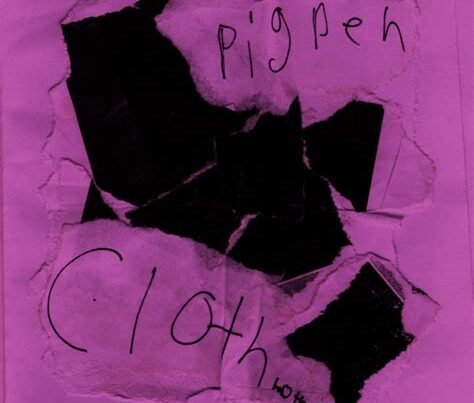Molchat Doma dial back gloomy minimalism in favor of more dynamic and enticing flavors of gloom on their latest album, Belaya Polosa.
Release date: September 6, 2024 | Sacred Bones | Facebook | Instagram | Bandcamp | Website
Goth is a spirit. This is a new mantra, for me, one that I will eventually describe in greater detail, but for now, let me just say that goth is something specific to many people, but in practice it is very diverse. I have, for most of my life, always enjoyed goth music and aesthetics. From the first time I heard Joy Division and Bauhaus, to diving into Projekt Records samplers and hearing Dead Can Dance, to how Type O Negative, Nine Inch Nails, or more recently Boy Harsher, The Soft Moon, or FACS have been mainstays in my listening rotations, I have always carried the spirit of the night in my soul. Outwardly, I tend to wear band t-shirts (often metal), jeans, and a baseball cap, far from fishnets, jewelry, eyeliner, and other trappings of the goth look. Yet, goth is a deep part of my lore.
So, back around 2019 or so, when I first heard Molchat Doma, I was immediately sold. Their lo-fi post punk and dark wave was maybe not unique, but a satisfying change of pace in its tone and origin. Goth circles online love to extol rare bands and records, especially from obscure European pressings, perhaps banned from their native country, each DJ looking for that rare gem that sets them apart from the rest of the red and purple neon crowd. Molchat Doma‘s Etazhi (2017) felt like one of those records, some time capsule unearthed in a dusty European club basement now widely available to share with your friends like some sort of elusive Funko Pop or baseball card.
Not to diminish the Belarusian band to a novelty, but there was a sense that their upswell in popularity was, in part, because they sounded like one of those rare records. This was exacerbated by the way they blew up on Tik Tok. Seemingly overnight, Molchat Doma was trending, hitting 2 million listens on Spotify and cracking the number 2 spot on a ‘Top Viral Hits’ playlist, or whatever it was titled. This was a breakout moment for the band and elevated them to new heights above their peers, of which in Eastern Europe there are plenty. They signed to Sacred Bones and were faced with the challenge of following up their breakthrough album.
2020’s Monument offered more of the lo-fi charm that Etazhi was now well-known for, but with a few brighter synth leads and more danceable beats, echoing their debut album more than their breakthrough. Monument was indeed more focused and somewhat more light-hearted, but it didn’t strike gold the way the hundreds of thousands of Tik Tok videos did. Now, their fourth full-length album Belaya Polosa is staged to be the next turning point for the band.
Balaya Polosa is still rooted in a synth and bass-heavy sound, but the band has gone through significant changes. Having left Minsk in search of safer, better lives, the duo relocated to Los Angeles to live and record their new album. The Sunshine State certainly offers a polar opposite environment to Belarus in many ways. Gone is the post-Soviet brutalism in the architecture, the mildly chilly and foggy climate, factories, and orthodox churches, replaced by California’s dry climate, nearly twice as many people, movie studios, palm trees, and a world renown population of hopeful celebrities with plastic smiles, hardly the setting one imagines when listening to the gloom of goth music.
This sea-change, however, is the best thing Molchat Doma could embrace for their latest album. Opening track, “Ty Zhe Ne Znaesh Kto Ya” immediately showcases their greatest change, dynamic and full production, with deep bass synth swells, hefty beats, popping snares, and bouncy synth leads. Suddenly, more reminiscent of Front Line Assembly than Joy Division, Molchat Doma are dancing on a higher plane, here. Vocals croon more than mope, and a sinister laugh from a vampire ascending from a long day’s slumber beckons chopped vocals to close out the jam. Late album highlight “III” keeps the night shade rave going with the sweetest FM synth sounds since the 1980s.
“Kolesom” envisions a Russian-speaking Ian Curtis resurrected to front New Order as we begin to realize that Molchat Doma are expressing the full breadth of their goth-tinged influences. They have new equipment at their disposal, but are at their essence the same band. “Son”, the lead single, harnesses their cold post-punk delivery in its full glory. Sisters of Mercy guitar leads carry this somber affair through near-surf rock bridges contrasting percolating synth arpeggios and slinky bass lines.
The title track dives further into the new wave and goth canon with Depeche Mode inspired electronics and vocals alongside a vaguely Robert Smith-feeling guitar and bass line. I almost want to hug these boys in appreciation for their masterful art as much as the plaintive sorrow they express, were it not for being a complete stranger and (presumably) a language barrier. Later, on tracks like “Chernye Svety” we hear snippets of Duran Duran and mid-career Talk Talk as the track flirts with our senses, invoking the steamy beach video for “Wicked Game” by Chris Isaak.
Belaya Polosa wears its many influences on its sleeve, and we are better off for it. For the baby bats who may have picked up on the dark, minimalism of their earlier work, this is a great exposure to the myriad vibes and sounds of synth-forward goth pop. For us old heads, it is a welcoming buffet of all of the delicious things that made us fall in love with the shadows in the first place, both a love letter to the spirit of goth and a brave step forward for Molchat Doma. This band does not deserve to be a simple meme, stuck in the revolving door of banality, and they prove that their prowess extends beyond flash-in-the-pan internet culture. Yeah, not everyone loves goth, new wave, or synth pop, but for those of us that do, Belaya Polosa is sweet, sweet candy for the ears.






